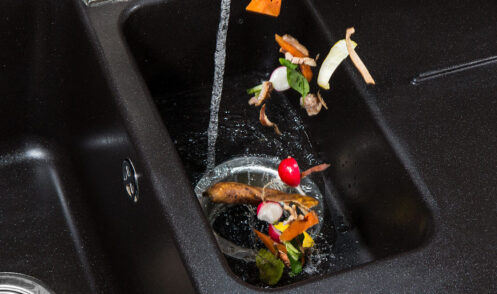
A garbage disposal can be a real time-saver in the kitchen, making cleanup after cooking easier by grinding up food scraps and sending them down the drain. However, like any appliance, it requires attention to function properly and stay in good shape. Knowing what can and can’t safely go down your kitchen sink is crucial to avoid damage to your disposal, clogs, and other issues that will require help from a professional plumber. Proper use and care of your garbage disposal will help ensure it runs smoothly and lasts longer.
Garbage Disposal Basics
A garbage disposal is a plumbing device installed under your kitchen sink. It features a reservoir with blades or teeth that grind food waste into smaller particles, allowing it to safely pass through your home’s plumbing system. Most standard residential disposals are blade-based because they are sufficient for everyday use.
When using your garbage disposal, it’s essential to run cold water through the drain along with the food scraps. Cold water helps solidify fats or oils, which can then be ground up more easily. If warm or hot water is used, these fats can liquefy and coat the inside of the pipes, leading to clogs over time. Cold water also helps keep the motor cool, preventing overheating.
Many foods can safely pass through your garbage disposal. However, other items can clog the disposal and your plumbing system, creating a headache.
Grease and Oil
While small amounts of oil and grease from cooked food are inevitable in your garbage disposal, you should always avoid pouring large quantities down it. Grease and oil are hazardous to your plumbing because they can solidify as they cool. Even when hot and liquid, they can coat the inside of your pipes, causing buildup and eventual clogs. Over time, this can lead to serious blockages and slow drainage.
Collect used grease and oil in a glass container and let it cool before disposing of it in the trash. You can also save it for reuse in cooking.
Animal Bones
You should never put bones down your garbage disposal. They are difficult to break down and can quickly damage your disposal’s blades. Additionally, if they manage to make it past your disposal, they can get lodged in your pipes. They can often lead to larger clogs as other debris accumulates around them. It’s always better to dispose of bones in the trash or compost rather than risk causing damage to your plumbing.
Fibrous Fruits and Veggies
Fibrous and stringy fruits and vegetables such as squash, celery, and lettuce may get stuck to the blades inside your garbage disposal and wrap around them. This may slow down the movement of your disposal and create added stress for the motor. The good news is that these types of organic waste break down well in compost, making them a valuable addition to your garden.
Egg Shells
Eggshells seem like a good candidate for your garbage disposal because they are fragile. However, the thin, sticky membrane inside the shells can cling to the disposal’s components and the inside of your pipes. Over time, these membranes may accumulate other debris, potentially leading to blockages and unpleasant odors. Additionally, eggshell fragments can dull the disposal blades, reducing their effectiveness.
Raw Meat
Raw meat can easily get stuck inside your garbage disposal or cling to the sides of your drain pipes. When this happens, the lingering meat can start to harbor bacteria, leading to unpleasant odors and potential health hazards in your kitchen. Unlike cooked meat, which breaks down more easily, raw meat’s sticky texture and higher fat content make it more prone to causing problems. If you need to dispose of small amounts of cooked meat, it’s generally safe for your garbage disposal. However, large quantities of any kind of meat should discarded in the trash to avoid plumbing issues.
Coffee Grounds
Although ground coffee starts out light and dry, it behaves differently once wet. When combined with water, coffee grounds tend to clump together into a dense, sludge-like mass. This can easily accumulate in your disposal and pipes, increasing the risk of clogs over time. The small, granular texture of coffee grounds also makes them more likely to settle in the bends and curves of your plumbing.
Breads and Pastas
Bread, pasta, and other starchy foods may seem harmless, but they expand when exposed to water. These foods often turn sticky and gooey and easily adhere to the inside of your garbage disposal. In addition, starchy foods are particularly troublesome for your plumbing, as they can swell up in your pipes.
Chemicals
Reaching for a drain cleaner may be tempting if you are dealing with a clog in your garbage disposal. However, you should never pour harsh chemicals down your kitchen sink or any other drains in your home. Even drain cleaners marketed as safe for plumbing are often highly caustic, which can corrode your pipes over time. This erosion weakens the pipe walls, increasing the risk of leaks and costly water damage. Instead of using chemical solutions, consider calling a professional plumber to address slow or clogged drains safely and effectively.
Non-Food Items
A good rule of thumb is that if it isn’t food, it doesn’t belong in the garbage disposal. Make sure to remove any wrappers, stickers, or labels from fruits and other foods before sending them down the drain, as these items can easily cause clogs. Additionally, avoid putting paper towels, cleaning wipes, or other paper products into the disposal. These materials can wrap around the internal components, slowing down the motor and increasing the risk of jams or blockages. Manufacturers only design garbage disposals to handle food waste, so anything inedible should go in the trash instead.
Safe Foods
Many foods are safe to grind up in your disposal. In fact, several items are even beneficial to keep the device clean and healthy.
Soft Foods
Soft foods include cooked vegetables, soft grains, and small scraps of cooked meat. If the food is soft enough to be easily broken down with a fork, it’s likely safe for your disposal.
Ice Cubes
Running a few ice cubes through your disposal is an effective way to clean the blades and interior. The hard texture of ice helps dislodge food particles and residue that may have accumulated, keeping your disposal fresh and free of buildup. They can also help sharpen the disposal’s blades.
Fruit Peels
Adding small pieces of citrus peels (like those from lemons or oranges) can leave your garbage disposal smelling fresh. The natural oils in citrus act as a deodorizer while helping clean the disposal’s components. Just be sure to cut the peels into smaller pieces to avoid overloading the disposal.
Contact Your Local Professionals
At Liberty Comfort Systems, we have been serving the residents of Anoka, MN and the surrounding areas for years. In addition to garbage disposal installation and repair, we can help with all your other plumbing needs, such as repiping, drain cleaning, and installing whole-home water treatment systems. As your one-stop homecare provider, we also offer electrical and HVAC services. Contact us today to schedule an appointment with one of our experienced team members.

